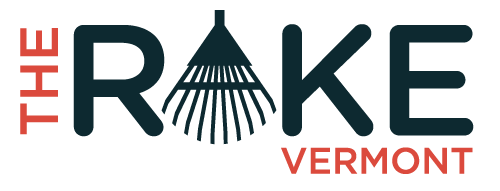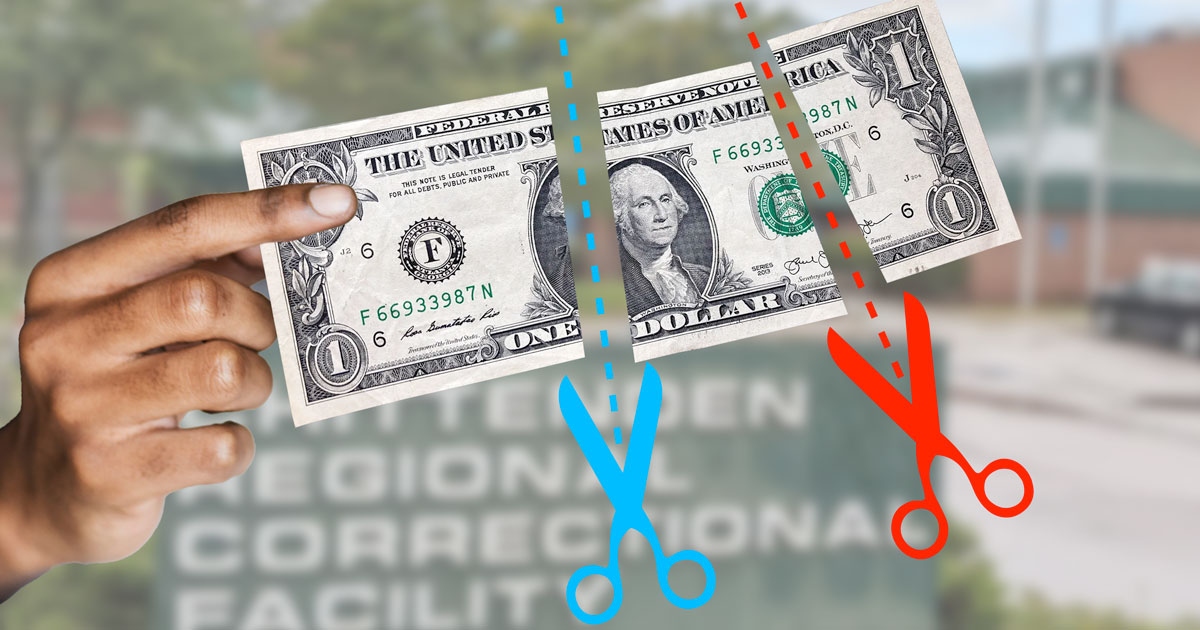In Part 4 of this series we look at how Global Tel Links and their subcontractors profit from the Department of Corrections Commissary. Read the other parts of this investigative series here.
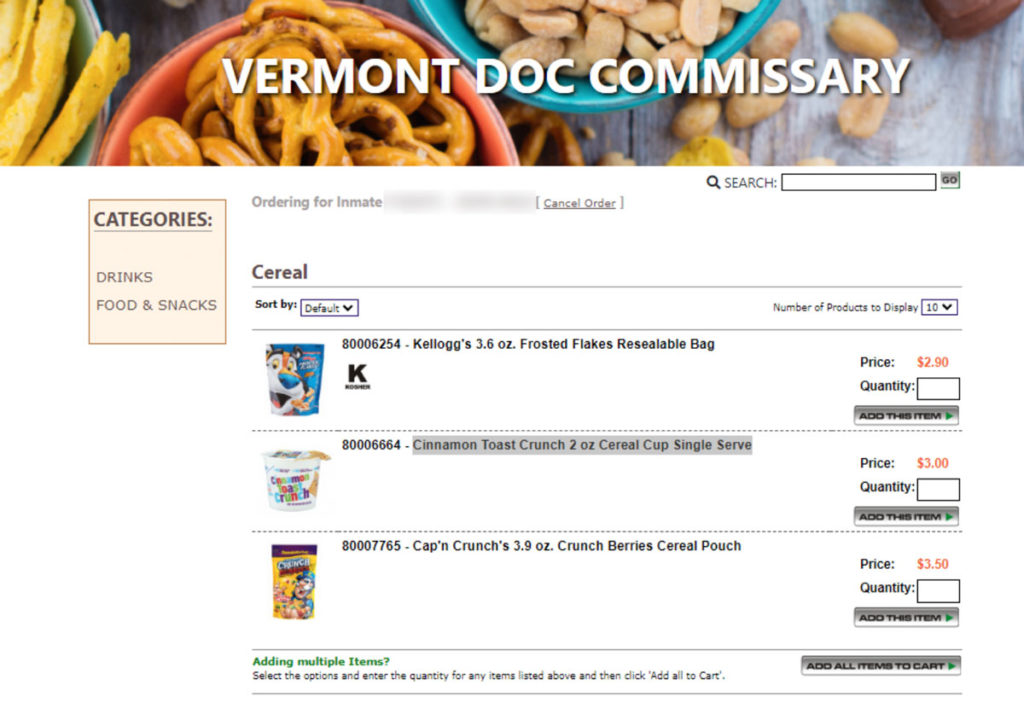
Vermont’s Department of Corrections signs exclusive contracts that give companies a closed monopoly on services provided to people who are incarcerated. Global Tel Links (GTL) provides all telecommunication services, and Keefe Group, a subcontractor of GTL, provides all commissary items. Keefe Group has their own closed monopoly in which they sell exclusive products to the DOC, to the detriment of those incarcerated and their families and support networks.
The Vermont DOC acknowledges that “[c]ommunication with family and friends and the ability to order specialty foods and other items through the Commissary are fundamental needs for the incarcerated population,” and yet the DOC receives commissions for providing these fundamental needs at exorbitant prices. Corrections officials justify these commissions, which increase costs for those incarcerated by 32%, by claiming that this money funds several recreation officers, recreational supplies, and activities.
Falko Schilling, advocacy director at ACLU Vermont, said that these contracts and how they operate are “definitely a concern,” emphasizing that if the DOC budget needs “increased funding to make sure that people can get basic needs and services that they should be getting while they’re incarcerated, then the state should be adequately funding those services, as opposed to placing the burden on people who are incarcerated.”
The Keefe Group: Private Monopoly and Lawsuits
Prison commissaries are unique in the United States because they are a closed economy. A handful of companies dominate the market, and due to stringent requirements around food and item packaging and manufacturing, only a handful of companies produce exclusively for prisons.
Because of this, companies such as Keefe Group, a billion-dollar company that controls a large percentage of the prison commissary market, have developed several private food labels that are not sold on the open market.
While most people have never heard of these products, such as Brushy Creek, Fresh Catch, Cactus Annie’s, Market Square Bakery, Moon Lodge, and the Whole Shabang, they are sold throughout the country and make a solid yearly profit for shareholders.
When we look at how some of those services are delivered within the correction system, it’s obvious that folks don’t have any choice in where they get those services, or what price points to get those services at, which creates a real problem when you have very limited resources and an inability to earn those resources. And we also see things costing far more within an incarcerated setting than they might for folks on the outside.
It is difficult to accurately portray the markup of products that are not sold on the open market, but by comparing products to Walmart and Amazon, evidence shows that food and drink in the Vermont prison commissary is often sold at double or triple the market price.
One extreme example is a 4-ounce packet of Folgers Coffee that sells for $8.85 at the Vermont commissary, which is equal to $35.4 per pound of coffee, while at Walmart a 10.3-ounce container of the same coffee sells for $5.72, or $8.88 per pound.
Across the lake in New York, E-Ford Commissary, a private commissary provider for NY state prisons, sells the same 4-ounce packet of Folgers for $3.80, a 233% increase from Keefe. While only about a dozen of the same products were sold by both E-Ford and Keefe, and both companies had higher mark ups than Amazon or Walmart, incarcerated Vermonters paid far more for the same products as those in New York state.
Price Comparison: VT and NY Prisons
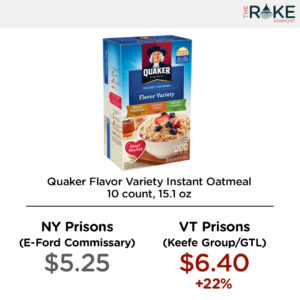
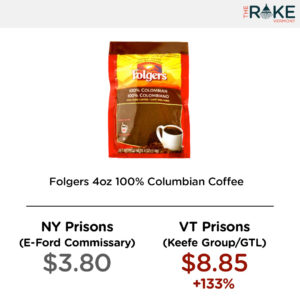
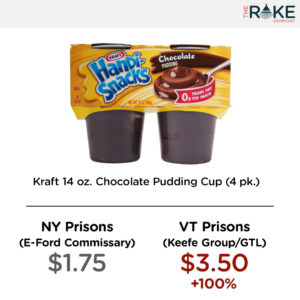
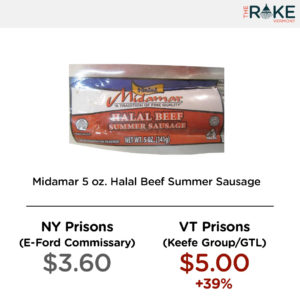
Keefe Group often works with GTL and, like GTL, has faced lawsuits regarding bribes and predatory business practices. In 2015, Keefe Group was caught in the same bribery scandal in Mississippi in which GTL employees were bribing corrections officials, and by 2019 courts declared that Keefe Group owed the state of Mississippi $3.1 million.
In Iowa, two formerly incarcerated people are suing Keefe Group for keeping thousands of dollars in music downloads which they had bought, claiming that the state has turned the Iowa prison system, through the Keefe Group, into a “monopolistic franchise cornering the market on anything and everything purchased” in prisons.
A similar lawsuit was filed in Florida on behalf of formerly incarcerated residents there. Keefe Group has also been unsuccessfully sued in Michigan for predatory fees and is currently fighting a class action lawsuit for predatory fees in Washington state.
How Fees and Commissions Can Add Up
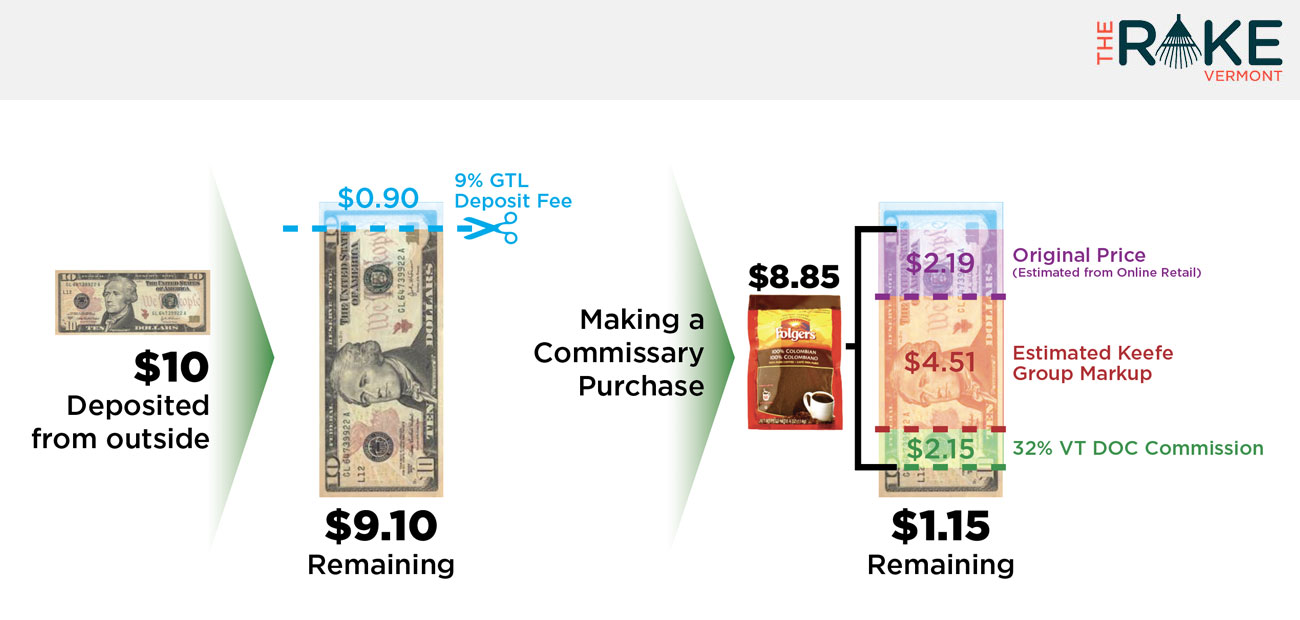
Millions Paid to Vermont DOC in Commissions Create a Perverse Incentive
Due to the monopoly that GTL has over Vermont prisons and its business relationship with Keefe Group, it is difficult for Vermonters who are in prison to pay reasonable prices for items they buy from the commissary. Moreover, the Vermont DOC does not provide a public price list of goods, which might otherwise limit exploitative pricing. Prices can only be found by manually browsing through the commissary site’s e-commerce portal, hidden behind an online form.
On top of the commissions, paid by incarcerated people, GTL charges a 9% fee for all outside funds deposited in incarcerated people’s accounts. While the total amount collected has decreased in proportion to a decrease in overall numbers of incarcerated Vermonters, data from the Department of Corrections shows that from 2019-2022, incarcerated Vermonters paid the DOC nearly $2.4 million in telecommunication and commissary fees. This averages out to over $500 per incarcerated person. If they were to pay this just out of their wages, these fees alone would equal to half of their yearly salary.
Throughout the country, it is common for the DOC to take a cut of commissary sales. According to an article from Knock LA published earlier this year, the LA Sheriff’s Department earned nearly $30 million from commissary sales through Keefe Group. On top of the steep prices set by Keefe Group, and the resulting fees the LASD recieves, they added a 50% markup on commissary products, allegedly using the commission revenue for an Inmate Welfare Fund.
In that same article, they point out that in a Keefe Group is being sued by one formerly incarcerated person in Mississippi, claiming that “officials know the company charges inmates prices far higher than market rates,” but they allow the practice “because [they get] a portion of commissary profits,” while Keefe has threatened to keep their digital media hostage if Mississippi switches vendors.
The high cost of commissary items, along with limited choices, has left a majority of prisoners displeased. According to a damning 2021 report by UVM’s Justice Research Initiative from a survey of those incarcerated in the Southern State Correctional Facility, over 90% of those incarcerated did not feel that they could use other vendors adequately, nor did they believe that prices were reasonable. Nearly 90% said there were not enough options or variety of items to buy, while over 70% did not believe that items sold were of good quality.
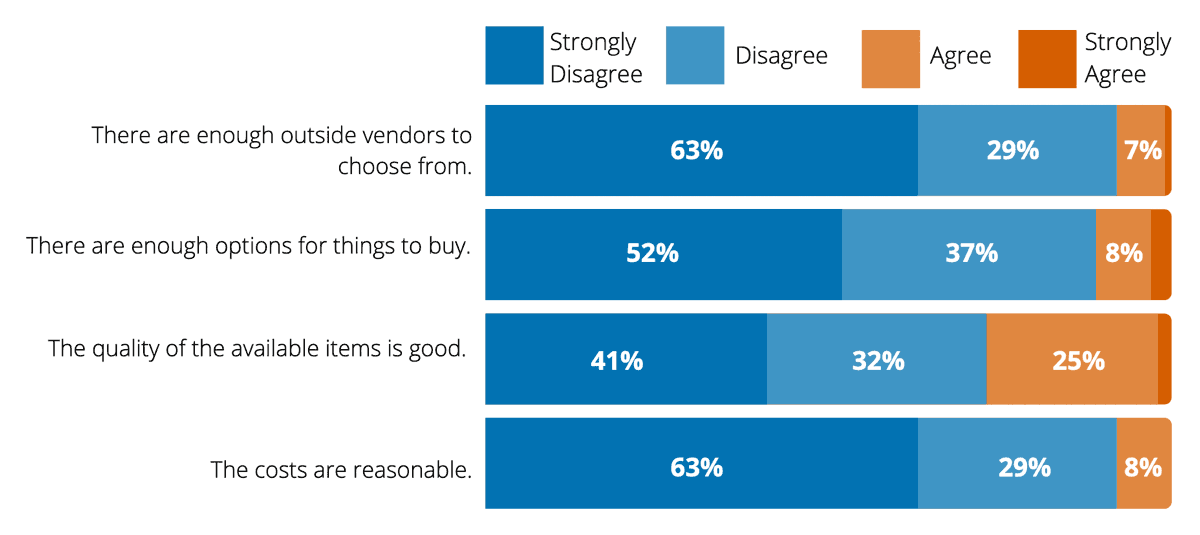
Twice in the last two decades Vermont politicians have attempted to limit this price gouging. In 2019 and 2021 Burlington State Representative Barbara Rachelson introduced a bill to limit GTL and DOC profits by regulating the “markup on commissary and telecommunication prices in prisons.” Both bills died in committee.
Emily is a writer and organizer on the editorial collective of The Rake Vermont.
